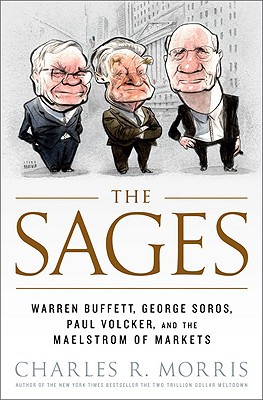

| THE SAGES Warren Buffett, George Soros, Paul Volcker, and the Maelstrom of Markets Charles R. Morris New York: PublicAffairs, June 2009 |
Rating: 5.0 High |
|||
| ISBN-13 978-1-58648-752-2 | ||||
| ISBN-10 1-58648-752-3 | 199pp. | HC | $23.95 | |
This book profiles three of the financial gurus of our time: George Soros, Warren Buffett, and Paul Volcker. These men are very different in character, but they share an almost intuitive grasp of markets and investments. They also share three elements of philosophy: a distaste for the Chicago School of economics, with its monetarist, laissez-faire dogma of "efficient markets"; mistrust of esoteric financial instruments like credit default swaps; and opposition to "merger mania", which tends to increase debt loads on companies and penalizes long-term thinking.
The profiles are good for a quick overview, but are quite sketchy and sometimes omit important details. That's forgivable, though, for the author's main purpose in writing this book is to illustrate the profound weakness of economics as it is currently practiced. By contrasting the methods and philosophies of these three men with what might be called "herd economics,"2 he demonstrates this very neatly. I give two examples of his evidence in the sidebar and in the table below.
In his Introduction, Morris tells us that 101 of 102 forecasts of unemployment and GDP growth by 51 leading economists published in the Wall Street Journal were wrong. These were forecasts made in late 2007 and early 2008, when the housing bubble was already collapsing.
"For true believers in free-market ideology, it is the worst of all possible worlds—and they brought it on themselves. Greenspan practically wept at the congressional hearing when he conceded that he had never imagined that market professionals could be so reckless and so wrong. And as the Journal's forecasting tabulations suggest, as late as last year, mainstream economists still did not understand what was going on." – Page xi |
However, Soros had warned of the oncoming financial crisis in the 1990s, Buffett a few years later. Volcker too understood the danger, but Morris implies he held his tongue for political or professional reasons.
A key point made by the author is that the widespread faith in market self-correction is a pipe dream. As with the poor macroeconomics predictors he mentions in the Introduction, the Chicago School holds that no single individual can outsmart the market. Warren Buffett blows this out of the water with a comparison reported on page 57. The table shows that seven of his fund managers following Graham-Dodd theory, which calls for rigorous analysis of company fundamentals before investing, hugely outperformed the Standard & Poor's 500.
| Fund | Period | S&P 500 | GP | GP/S&P | LP | LP/S&P |
|---|---|---|---|---|---|---|
| GP is general partner; LP is limited partner in the firm. The author notes, "* Benchmark is DJIA." | ||||||
| No. 1 | 28 years | 887% | 23,105% | 26.0 | 6,679% | 7.5 |
| No. 2 | 16 years | 239% | 1,661% | 6.9 | 936% | 3.9 |
| No. 3 | 12 years* | 153% | 2,795% | 18.3 | 1,593% | 10.4 |
| No. 4 | 13 years | 270% | N/R | N/R | 775% | 2.9 |
| No. 5 | 13 years | 97% | 1,156% | 11.9 | 500% | 5.2 |
| No. 6 | 19 years | 306% | 22,200% | 72.5 | 5,530% | 18.1 |
| No. 7 | 18 years* | 389% | 4,277% | 11.0 | 2,309% | 5.9 |
"The current global economic debacle has discredited almost all the captains of the finance industry, the regulators of most nations, and the gurus in academia. But the Sages stand taller than ever. There is a lesson there, and one hopes the world will learn it." – Page 180 |
Morris's book is very readable, and gives a succinct yet detailed comparison of the views and practices of the three Sages, and some of their mentors, with mainstream economics orthodoxy. Its main shortcomings are the sketchiness of its biographies — forgivable, in my view — and some padding in places, as when he includes nine and one-half pages of Buffett quotes without comment. As I note, he succeeds admirably in his main purpose of describing the reasons why mainstream economics performs so poorly, not only failing to solve problems but too often exacerbating the conditions that create them. The book is of course well indexed and thoroughly end-noted. I therefore wish devoutly that it be read widely, though I don't rate it a keeper.

 To contact Chris Winter, send email to this address.
To contact Chris Winter, send email to this address.